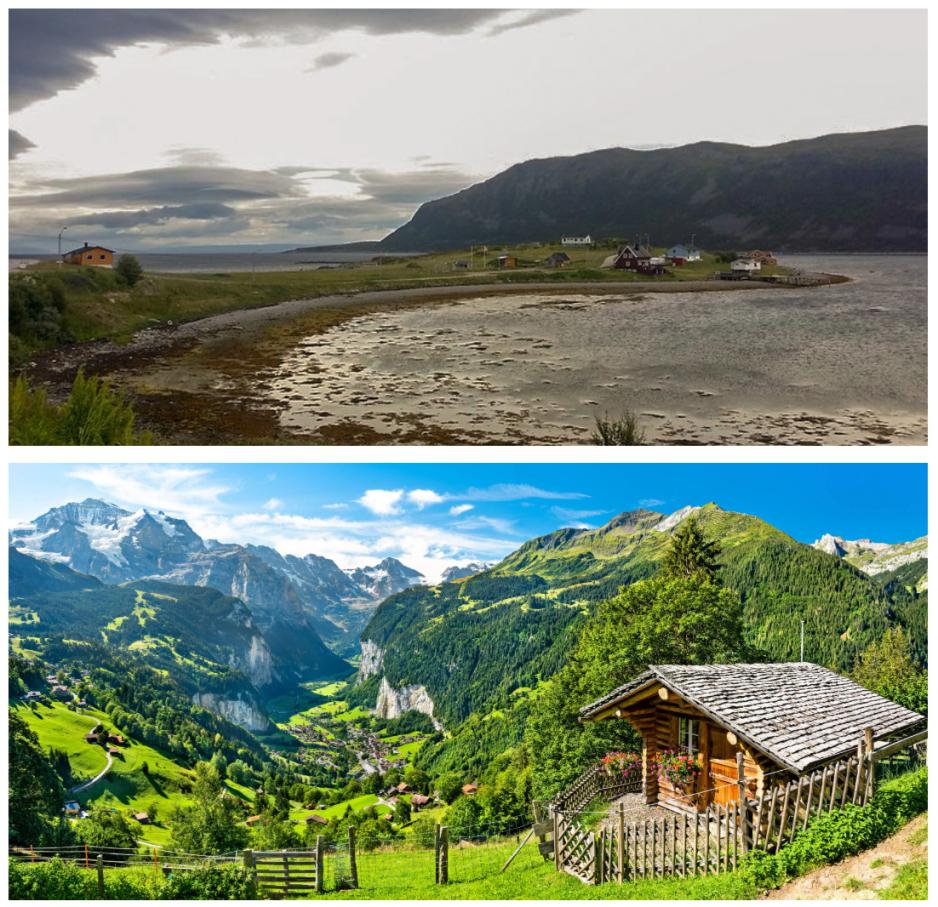Arne O. Holm says About Tax Refugees and the Flight From Northern Norway

It turns out it wasn't that safe to move one's fortune from Norway to Switzerland. And things won't be safe as the flight from Finnmark continues.(Photos: Manu el Loco under CC BY-SA 2.0 / AdobeStock)
Comment: About 200 Norwegians have fled taxes in the past few years and moved to Switzerland. That corresponds to the decline in population in Finnmark, Northern Norway, in the last quarter. The latter is more serious than the first.
I think about this while reading moving reports from Norwegians in Switzerland. A weak Norwegian currency has made things difficult for relocated Norwegians. A couple of years ago, as the flow of refugees started to increase, you could get a Swiss franc for about nine Norwegian kroner. The same franc now costs 12,40.
Weighs heavy
That stings. But as Jens Rugseth tells Dagens Næringsliv, he still fills up his tank and eats potatoes for dinner.
"But it weighs heavy," he adds.
The majority of the relocated have values and incomes in Norwegian kroner. Thus, the Norwegian government continues to taunt them. Now, by actively (if we are to believe the accusations) weakening the Norwegian currency.
A thorn in the flesh.
A thorn in the flesh.
Yet, this is not the whole story. A weak krone exchange rate leads to increased export income and, thus, greater fortunes for many of the emigrants, but I will leave that for another time.
But they have more in store. One of the arguments against the Norwegian tax policy, which motivated the flight, was unpredictability. It was apparently impossible to plan in Norway, even for those who could afford an abundance of tax planners.
This would turn out to not be a solely Norwegian concept.
New inheritance tax in Switzerland
In Switzerland, a new referendum is imminent. It will decide on a new inheritance policy on 50 percent of fortunes at over NOK 600 million. The money will be spent on climate measures and will only affect the ultra-rich.
Norway, the country they fled, has abolished inheritance tax. Fortune follows DNA. This was not necessarily a wise move, either financially or in terms of distribution, but it was abolished nonetheless. Instead, Norway has a marginal wealth tax, even though the wailing of relocated Norwegians makes it sound like a deliberate economic assassination attempt.
Then, what should one call an inheritance tax of 50 percent?
How unpredictable and brutal the world can be.
Won't be easy
I am quite sure their bounty of tax lawyers are already planning new escape routes. But it won't be easy. In the UK, another safe haven for super-rich refugees, things are heating up. A law from 1799 has, until now, provided tax amnesty for the ultra-rich foreigners in England. That is now coming to a halt.
That is how unpredictable and brutal the world can be.
Yet, new escape routes will spawn from the extreme resistance to conforming to the community's rules and, instead, choosing to travel around looking for safe tax havens.
This brings us back to Finnmark, where the flight southward is comparable to the number of tax refugees.
It is a bigger problem for Norway that our northernmost county is emptied of people from both a security policy and resource perspective than some municipalities in the south must adapt their municipal economy with a few decimals. Particularly in a situation where one of Northern Norway's neighboring countries is waging war against another neighboring country.
Already planning new escape routes.
If the richest flee, it might be more challenging to assemble a municipal budget in Asker and Bærum in the South.
Far from perfect
However, for each Finnmark resident that leaves, it becomes harder to maintain the Norwegian defense capacity.
And for each employee that chooses to commute instead of living in the North, be it in oil, gas, fisheries, or defense, the municipal budgets are weakened because the tax goes to other municipalities. Almost like Switzerland instead of Asker or Bærum
The Norwegian tax policy is far from perfect. Neither is the structure of the wealth tax.
But it helps neither the Norwegian economy nor the Norwegian security policy that the discussion drowns in the cacophony of tax refugees who want to decide over the Norwegian economy, even after leaving the nest.



